Athletic performance is closely linked to recovery, which begins with proper nutrition. For athletes of all skill levels, the post-workout window is critical a time when muscles recover, glycogen stores are replaced. The body prepares for future activity. While intense training sessions might test an athlete’s endurance and strength, recovery is when progress is reinforced. A well-chosen post-workout meal speeds up recuperation, improves performance, and, ultimately, helps to achieve new fitness goals.
Muscle repair is an essential part of this process. During relentless training, muscle fibers sustain tiny tears, and the body’s response to these tears repairing them stronger than before—is what causes muscle growth and endurance. Certain diets supply the building blocks and energy required for this repair process, mostly in the form of macronutrients such as protein and carbs, as well as essential micronutrients that lower inflammation, restore electrolytes, and accelerate healing.
Understanding which foods are best for recovery allows athletes to create a long-term nutrition strategy that supports their goals. The following five foods have been extensively recognised for their ability to promote muscle repair and athletic recovery. Each of these foods has unique properties that make it great for the post-exercise phase, providing critical nutrients to aid in recovery and prepare the body for the next activity.
Importance of Nutrition in Muscle Recovery
A proper post-exercise diet replaces glycogen stores, slows muscle protein breakdown, and increases protein synthesis. Recovery foods also help to rehydrate the body, regulate inflammation, and provide antioxidant support, all of which are essential components of an efficient recovery plan. Incorporating targeted recovery foods regularly speeds up healing, reduces fatigue, and lowers the risk of injuries caused by poor recovery.
The “anabolic window” refers to the 30-45 minutes following an exercise when nutrient absorption is at its peak, making it the best time to take recovery foods. During this time, muscles are very responsive to nutrition, allowing for rapid glycogen replenishment and muscle repair. Consuming high-protein, moderate-carbohydrate diets during this period can dramatically improve muscle repair.
Consume a high-protein, high-carbohydrate snack within 45 minutes post-workout and ensure that larger, balanced meals follow 1-2 hours after training. We dive into the top recovery foods for athletes to speed up muscle repair.
Top 5 Recovery Foods for Athletes
5. Bananas with Almond Butter
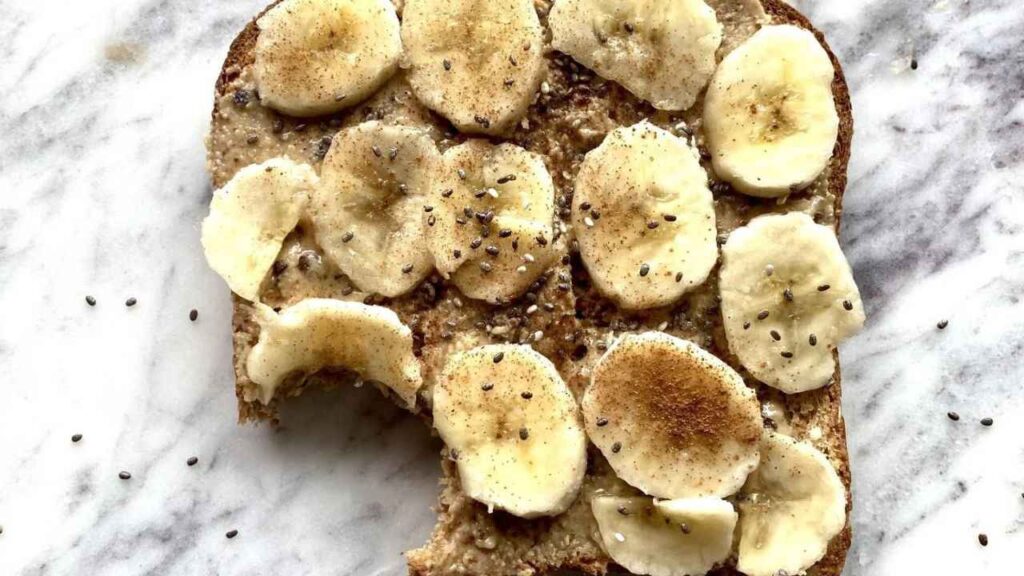
Bananas are one of the most popular post-exercise recovery foods because of their high potassium content, which helps replenish electrolytes lost through sweat. They are great for post-exercise recovery because they contain potassium, which helps with muscle contraction and prevents cramping. Bananas also include easily digestible carbs that help to restore glycogen levels.
Mixing bananas and almond butter provides a source of healthy fats and protein, which helps to stabilise blood sugar and promotes muscle recovery. Almond butter also includes vitamin E, which is an antioxidant that decreases oxidative stress in muscles.
4. Quinoa and Chickpeas
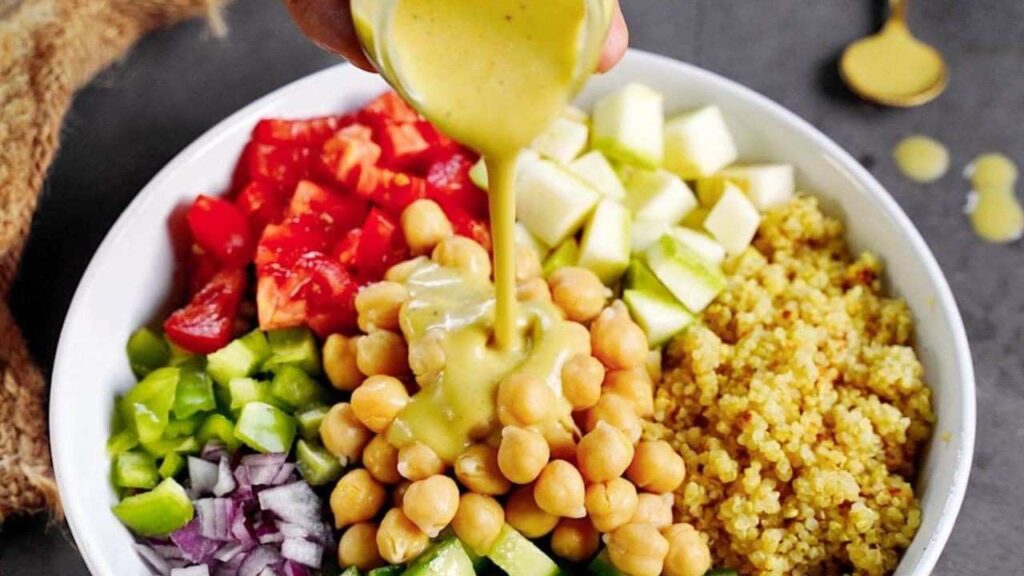
Chickpeas and quinoa are ideal post-workout foods for plant-based athletes. Quinoa is one of the few plant foods that is a complete protein, providing all of the amino acids required for muscle repair. It also contains plenty of fiber, magnesium, and iron, all of which help with muscular function and endurance.
Chickpeas provide an additional layer of plant-based protein and are strong in complex carbs and fiber, which help to replace glycogen and maintain stable blood sugar levels. Quinoa and chickpeas provide a nutrient-dense recovery meal that improves muscle regeneration, aids digestion, and regulates energy levels.
3. Eggs and Whole-Grain Toast
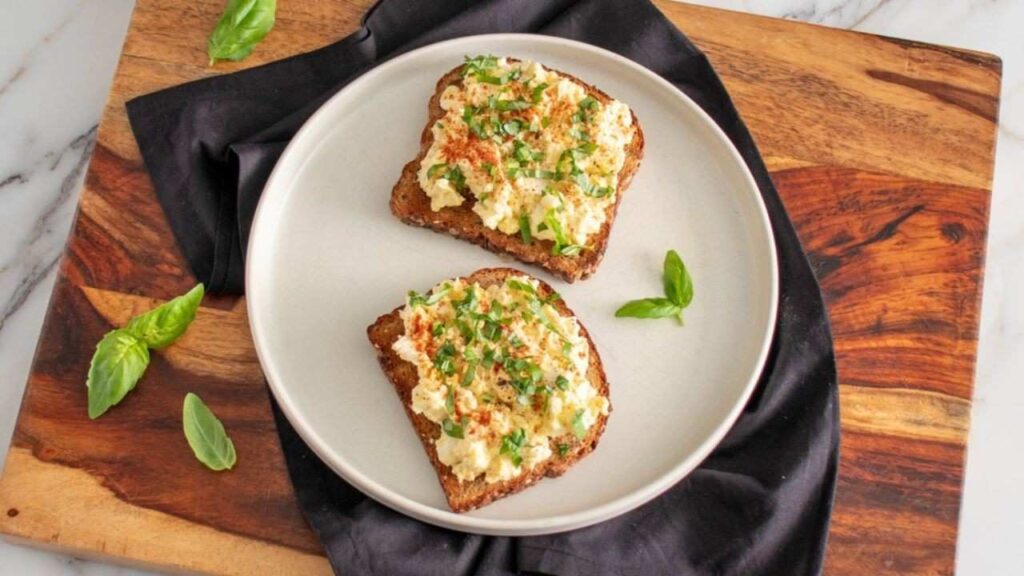
Eggs are one of the most complete protein sources available, providing all nine essential amino acids required for muscle repair and synthesis. They are also high in vitamins D and B12, which promote bone health and red blood cell synthesis, respectively. Because of their versatility, eggs are an excellent choice for athletes seeking speedy and efficient recovery.
Pairing eggs with whole-grain toast supplies complex carbs that help restore glycogen and boost energy levels. Whole grains include more fiber than refined grains. It helps to manage blood sugar levels and ensures that energy from carbohydrates is released gradually. Eggs and whole-grain bread form a well-balanced lunch that provides the protein and carbohydrates needed for post-exercise recovery.
2. Salmon and Sweet Potato
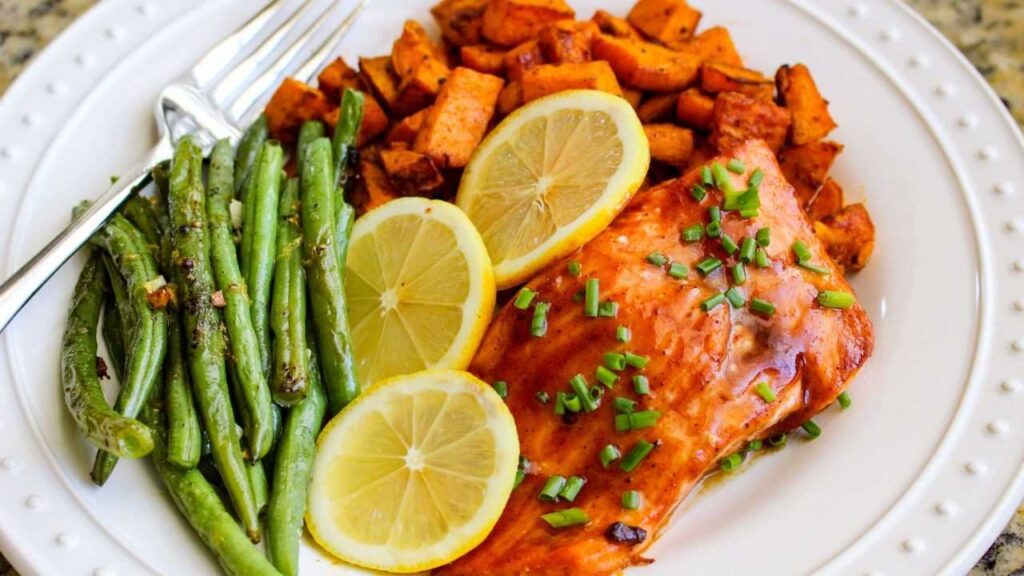
It is high in omega-3 fatty acids, which are known for their anti-inflammatory characteristics and capacity to promote heart and joint health. Salmon contains omega-3s, which minimise muscular pain and inflammation, making it an excellent choice for post-exercise rehabilitation. Salmon also contains high-quality protein, which helps with muscle repair and growth.
Combining salmon and sweet potatoes gives a rich amount of complex carbs required to rebuild glycogen stores. Sweet potatoes are high in vitamins A and C, which have antioxidant characteristics that help minimise oxidative stress in muscles. Sweet potatoes’ fiber content allows a consistent release of glucose, which promotes sustained energy levels during recuperation.
1. Greek Yogurt with Berries
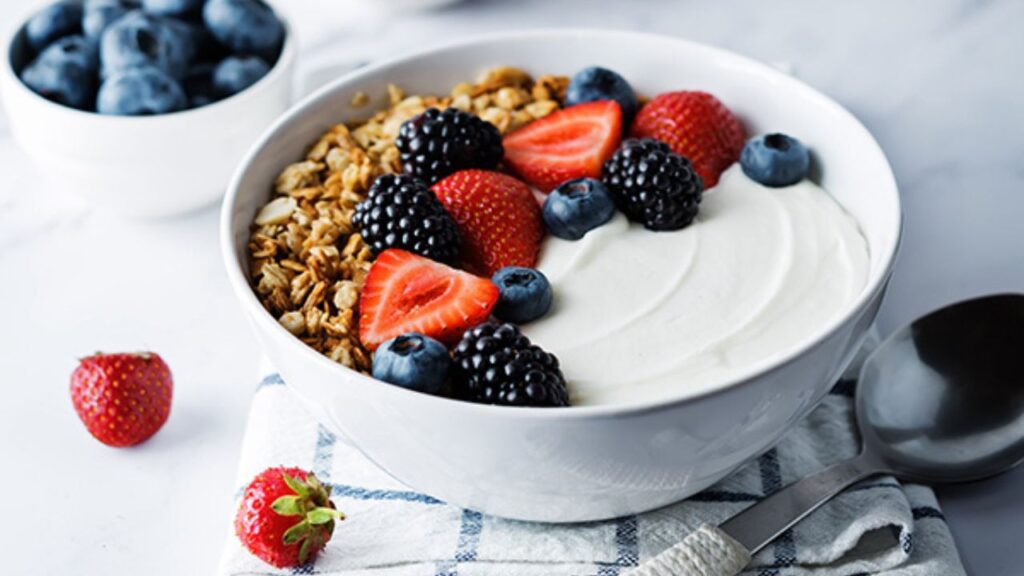
Yogurt is a good recovery food for athletes because it contains high-quality protein rich in important amino acids, particularly leucine, which promotes muscle protein synthesis. Greek yogurt contains roughly double the protein level of conventional yogurt, providing a significant amount of protein in each serving, which is required for muscle repair and growth. Additionally, the calcium in yogurt promotes bone health and alleviates muscle cramps.
Pairing Greek yogurt with berries like blueberries, raspberries, or strawberries boosts its recovery properties. Berries are high in antioxidants, specifically anthocyanins, which aid to minimise muscular inflammation and oxidative stress. Greek yogurt and berries make an excellent post-workout snack that contains protein, antioxidants, and natural sugars to replace glycogen levels.
The Nutritional Key to Success
Incorporating useful recovery foods into your post-workout regimen can significantly improve athletic performance, muscle healing, and overall energy levels. Greek yogurt with berries, salmon with sweet potatoes, eggs with whole-grain bread, quinoa with chickpeas, and bananas with almond butter are five high-quality options that provide critical nutrients for muscle repair, glycogen replenishment, and inflammation reduction.
By focusing on balanced meals high in protein, carbs, and critical micronutrients, athletes can ensure that their bodies have the optimum tools for recovery, equipping them for sustained success in their fitness journeys.
Also Read: Upcoming Olympic Games preview
Also Read: Dolly Gupta wins bronze at state-level sub-junior wrestling competition
Also Read: Rohit Sharma on the impact player rule


